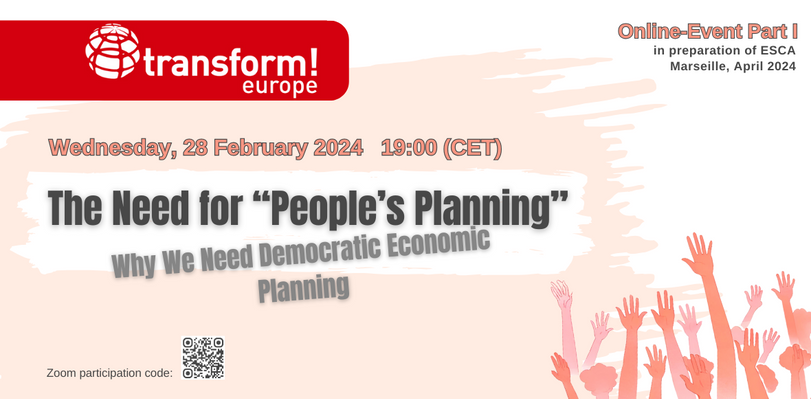transform! europe is hosting a public discussion on democratic economic planning in the European Common Space for Alternatives in Marseille at the end of April. In preparation there will be three virtual meetings, all taking place via zoom.
The first meeting “The Need for “People’s Planning” – Why We Need Democratic Economic Planning”
will take place on 28 February at 7pm (CET)
The aim of this first event will be to explain the background to the current debate on a planned economy: where are we coming from? What are the pitfalls of the past and present debate? What does the left have to consider if we want to establish a real counter-concept to the so-called free market?
Speakers:
- Heinz Bierbaum, Chairman of the Executive Board of the Rosa-Luxemburg-Stiftung, Berlin
- Claire Lejeune, researcher at the Institut La Boétie department, Paris
Moderation:
- Roland Kulke, facilitator of the Working Group Productive Transformation, transform! europe, Brussels
Click here to participate via zoom.
Meeting-ID: 890 6997 8368
20.03.24 UPDATE
READ HERE THE REPORT
on the seminar’s first session
(click to download)
|
The second online event will take place during the week of 18-22 March, at 19:00 CET. The speakers will be Christoph Sorg (Humboldt University, DFG project “capitalist planned economies”) and N.N. The third online event is scheduled for week 15, once again in the evening at 19:00 CET, between 8 and 12 April. On this occasion, Anaïs Fley, cordinator of the working group on the radical, extreme and populist right at transform! europe (Paris) and Cedric Durand (Geneva, by request) will discuss the extent to which new digital technologies can potentially address essential problems of a planned economy. Theoretically, many past counter-arguments (keyword: “socialist calculation debate”) can be considered resolved in favour of a planned economy, with reference to computing capacities. However, where is the democratic element? Where is the space for common discussion? Our fourth event will take place during the ECSA (European Common Space for Alternatives) in Marseille from 26 to 28 April. During these days, which we are currently discussing with the organisers, we aim to host at least one round table and a larger open meeting where all individuals interested in the topic can engage in practical discussions. We hope to explore possibilities for future collaboration beyond Marseille, continuing our discussions, actions, and cooperation. |
Our societies are at a crossroads. The economic conflict between the old industrialised societies of the West and the emerging economies of the Global South, especially China, has long since led to serious geopolitical conflicts. Although China’s industry has become increasingly innovative, its international competitiveness is largely due to low exchange rates and massive state subsidies.
The West has lost its traditional economic leadership in key sectors. This is particularly true in sectors that promise future profits, such as renewable energy, biotechnologies and computer chips with quantum computers. It is precisely these sectors that Biden’s security adviser declared a few years ago to be part of national security.
In other words, the US is not pursuing free-trade imperialism, but a massive, controlled industrial policy designed to “pick the winners”. The Biden administration is concerned with national security (especially military) and jobs. The EU has followed suit, albeit miserably, but at least with some programmes (Green Deal and STEP programme). There is now no leading industrial power, young or old, that is not diverting ld, that does not channel significant parts of its surplus into strategic industries.
Can the left be satisfied? The state intervenes, also to safeguard jobs? No, this geopolitically exploited state industrial policy is a major challenge for the international left, both practically and for our theoretical discussion. What we see is neo-liberal, imperialist state interventionism. This state-directed economy, as it is emerging, essentially serves the profit interests of capital and corresponds to the Wall Street consensus.
One of the cornerstones of the left is the critique of the belief that the market is the best means of allocating goods and “human capital” for our societies. After the end of the real market, the theoretical discussion about democratic economic planning was not pursued in any significant way for two decades, probably also due to a lack of lived reality. This has only changed in recent years.
Discussions are taking place in different countries, under different names, but at least partly revolving around similar questions: how can we create a fairer and more sustainable economy in the face of exploding social inequalities and already overstepped planetary boundaries? Since the so-called free market has got us into this situation, we on the left at least argue for a controlled economy in key sectors.
In the Anglo-Saxon debate it is the “Green New Deal“, in France it is “planification ecologique“, in India it is “people’s planning”, in China the concept of “ecological civilisation” is being discussed, in Germany Die Linke and the trade unions are leading the discussion on “transformation councils”. Concepts such as “Buen Vivir” or “Ujaama” can be taken up here.
![]() Report on Session 1
Report on Session 1
“The Need for “People’s Planning” – Why We Need Democratic Economic Planning”
